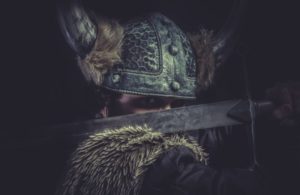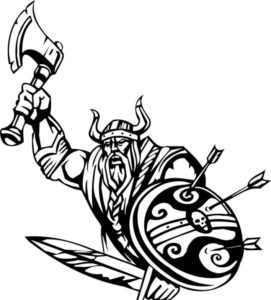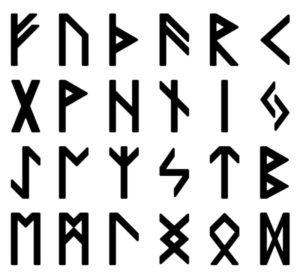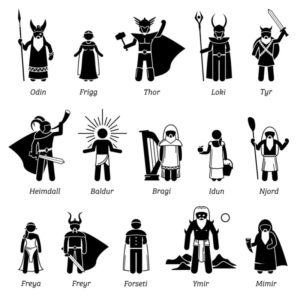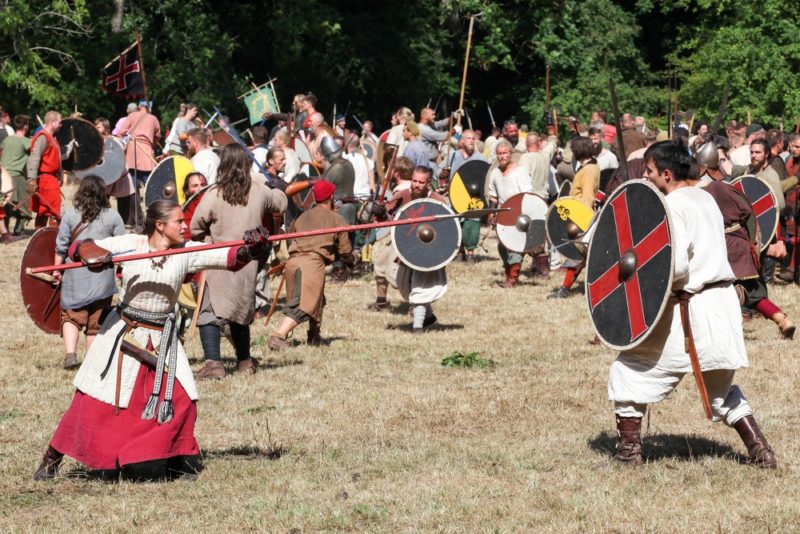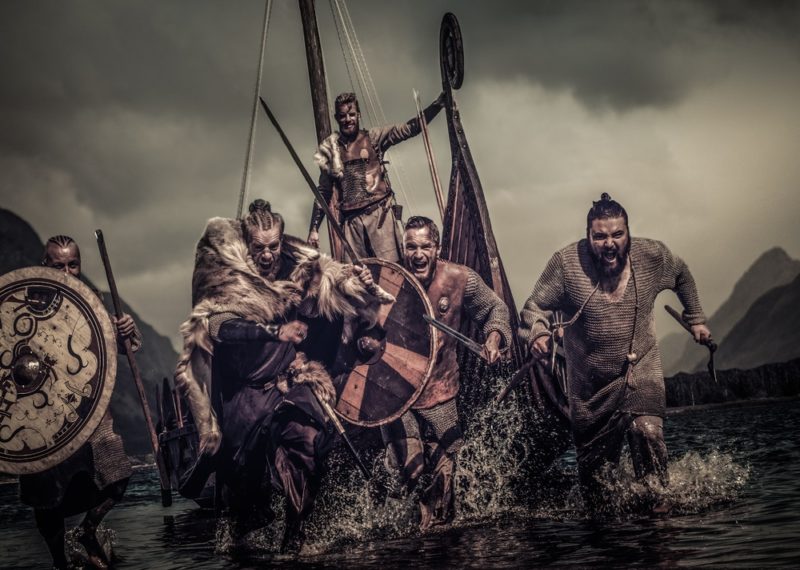The Vikings were known for being fearless warriors who traveled to distant lands. Because of this, there is much information available about this civilization that invaded other nations. Additionally, there have been several accounts of Viking life in the form of Norse sagas and Eddas.
Norse poetry provides many Old Norse folklore quotes, wisdom phrases, and Viking quotes. Many classic sagas and poems contain wise words from which we might all learn. Here are some Viking quotes to inspire you.
A Short Introduction to the Vikings
Before recounting Viking quotes, it would be helpful first to understand who the Vikings, sometimes referred to as the Norse, were. The Vikings were seafaring people who lived between the 8th and 11th centuries. Vikings were considered to be cruel and conquering, but evidence has proved that they were also a culturally and intellectually advanced civilization. These quotes cover a wide range of issues, including warfare, love, and dignity.
This selection of quotes comes from ancient sagas about the exploits of Viking forefathers. Until the 13th century, these legends were passed down for centuries by word of mouth before they were finally penned.
Understanding Norse Sagas and Eddas
The Vikings come from a long line of storytellers and poets. Poets were one of the most well-respected members of Norse society, and they could always count on money and hospitality in return for their gifts. Even Odin, the ruler of the Aesir gods, was known as a poet deity. Viking mead halls were alive with stories of gods, warriors, and history. However, the Vikings never recorded any of it.
The Vikings used runes as glyphs and letters that had special meanings. They also served ceremonial or perhaps mystical purposes. Vikings had no intention of composing stories with these sacred runes.
Iceland was in the midst of terrible political turmoil in the mid 13th century, over 150 years after the last Norse sailed the waters or fought in combat.
This political crisis turned into an existential crisis, and maybe, as a result, there was a tremendous intellectual drive to document the relics of their old past during this time. Viking lore was recorded for the first time and passed down to future generations.
This creative energy manifested in two ways: The first one was the Eddas, a collection of myths and poems about the deities, goddesses, and warriors of Old Norse mythology.
The second, though, might be more impressive: Icelanders recorded the tales of their forefathers and mothers — everyday women and men.
Viking quotes such as “Fear not death for the hour of your doom is set, and none may escape it,” and “Trust not him whose father, brother, or other kin you have slain no matter how young he be, for often grows the wolf in the child,” encourage us to be brave, discerning, and prudent.
Here are some inspirational Viking quotes that have been taken from Viking poems and sagas written in the 13th and 14th centuries.
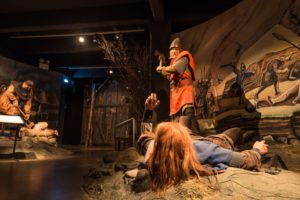
The Völsunga Saga C.
This saga is an Icelandic saga that dates back to the year 1250. The origin and demise of the Völsung line are depicted in Old Norse poetry from the 13th century. It includes the story of Brynhild and Sigurd and the downfall of the Burgundians and is among the most well-known legendary sagas and is also known as a “heroic saga” dealing with Germanic heroic legends.
The text includes Viking quotes such as “Where wolf’s ears are, wolf’s teeth are near” that warn of being aware of your surroundings and heroic motivation, such as that found in “Fear not death for the hour of your doom is set, and none may escape it,” which gives us insight into the heroism and bravery that Viking warriors exhibited in battle.
This saga also includes wisdom sayings, such as “Good to love good things when all goes according to thy heart’s desire.”
Motivational Viking Quotes from the Volsunga Saga C. 5 to 21
“Where wolf’s ears are, wolf’s teeth are near.” – Volsunga Saga c. 19
“Fear not death for the hour of your doom is set and none may escape it.” – Volsunga Saga c. 5
“Fight your foes in the field, nor be burnt in your house.” – Volsunga Saga c. 21
“Trust not him whose father, brother, or other kin you have slain no matter how young he be, for often grows the wolf in the child.” – Volsunga Saga c. 21
“When men meet foes in fight, better is stout heart than sharp sword.” – Volsunga Saga c. 19
“Let not thy mind be overmuch crossed by unwise men at thronged meetings of folk; for oft these speak worse than they wot of; lest thou be called a dastard, and art-minded to think that thou art even as is said; slay such a one on another day, and so reward his ugly talk.” – Volsunga Saga c. 21
“For whoso comes amongst many shall one day find that no one man is by so far the mightiest of all.” – Volsunga c. 18
“Good to love good things when all goes according to thy heart’s desire.” – Volsunga Saga c. 28
The Saga of Olaf Haraldsson
The Saga of Olaf Haraldsson, otherwise known as the Saga or St. Olaf or Olafs Saga Helga, is a kings’ saga about King Olaf Haraldsson, written in numerous variations. With additions from traditional oral stories, the story draws on skaldic literature and Latin hagiography.
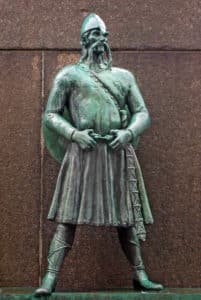
It includes Viking quotes such as “Too much ale and a man’s heart is laid open for all to see,” which encourages men not to become drunk, allowing others to discover their secrets. Other great quotes, such as “Folk stand with the great that they enjoy high honors, and are more respected than others, but stand often in danger of their lives,” warn that prestige and power come with many risks.
Viking Quotes from the Saga of Olaf Haraldsson
“Eagles should show their claws, though dying.” – Saga of Olaf Haraldsson c. 186
“A rotten branch will be found in every tree.” – Saga of Olaf Haraldsson c. 148
“The common always love what is new.” – Saga of Olaf Haraldsson c. 33
“Too much ale and a man’s heart is laid open for all to see.” – Saga of Olaf Haraldsson c. 151
“Kinsmen to kinsmen should be true.” – Saga of Olaf Haraldsson c. 186
“Who can’t defend the wealth they have must die, or share with the rover bold.” – Saga of Olaf Haraldsson c. 6
“Better it is to have a lower position in life and be free than to have a position of power only to be subject to the will of another.” – Saga of Olaf Haraldsson c. 79
“There are few things for which a match cannot be found.”- Saga of Olaf Haraldsson c. 86
“Folk stand with the great that they enjoy high honors, and are more respected than others, but stand often in danger of their lives.
The Saga of Hrafnkel Freysgothi
In the 10th century, conflicts arose among farmers and chieftains in Iceland’s east. The narrative written in the saga of Hrafnkel Freysgothi has been understood as the story of a man who comes to the realization that true authority is based on the devotion of one’s followers and not on the favor of the deities.
The exact date of the saga’s creation is unclear, but the late 13th century appears to be the most plausible possibility. It includes motivational phrases, such as “Often is there regret for saying too much, and seldom regret for saying too little,” which encourages people to choose their words carefully.
Quotes from the Saga of Hrafnkel Freysgothi
“Nothing good can happen to people who break their solemn vows.” – Saga of Hrafnkel Freysgothi c. 6
“Often is there regret for saying too much, and seldom regret for saying too little.” – Saga of Hrafnkel Freysgothi c. 7
“A person’s actions are often worse than their intentions.” – Saga of Hrafnkel Freysgothi c. 10
“He’s a wise man who knows himself.” – Saga of Hrafnkel Freysgothi c. 7
“It can be expected that a man who has a lot on his mind will not always be careful enough.” – Hrafnkel Freysgothi Saga c. 9
“Stubbornness brings either greater humiliation or greater honor.” – Hrafnkel Freysgothi Saga c. 10
The Saga of Harald Hardrade
The Saga of Harald Hardrades is an Old Norse king’s saga about the reign of Norway’s monarch, King Haraldr Sigurarson, who is commonly referred to as Harald Hardrada or Harald Hardrade in English.
It offers words of wisdom that encourage people to show kindness to others and display bravery in the face of adversity. Below are some of the best motivational Viking quotes from this saga.
Words of Wisdom from the Saga of Harald Hardrade
“Ill is the result of letting fear rule thine actions.”- the Saga of Harald Hardrade c. 46
“It is an old custom for the wisest to give way.” – the Saga of Harald Hardrade c. 27
“All a people need in order to rise up against tyranny is a leader bold enough to take up the banner.” – the Saga of Harald Hardrade c. 45
“Bravery is half the victory.” – the Saga of Harald Hardrade c. 103
Njal’s Saga
The Njáls saga is an Icelandic saga from the 1300s that covers events that occurred between the years 960 and 1020.
The tale depicts a bitter rivalry in the Icelandic Commonwealth, demonstrating how honor obligations may lead to petty slights spiraling into devastating and long-term carnage. Insults that challenge a character’s manhood are particularly common, and they may represent an author who is critical of a masculine ideal.
Even though there has been much discussion about the author’s identity, the piece remains nameless. The key events recorded in the story are most likely historical, although the author altered the information to fit his aesthetic goals by leaning on oral traditions.
The Njáls saga is the longest and most detailed of the Icelandic sagas. It is frequently regarded as the pinnacle of saga literature.
Viking Age Inspiration from this Saga
“Never cheat your master.”- Njal’s Saga c. 86
“Be warned by another’s woe.” – Njal’s Saga c. 13
“Slow and sure.” – Njal’s Saga c. 44
“It may often be that those live long who are slain with words alone.”- Njal’s Saga c. 45
“When ill seed has been sown, so an ill crop will spring from it.” – Njal’s Saga c. 114
“Birds of a feather flock most together.” – Njal’s Saga c. 51
“Nothing ventured, nothing gained.” – Njal’s Saga c.5
Vatnsdæla Saga
The Vatnsdæla Saga is a family narrative that was most likely written around the mid 13th century. It is about the people of Vatnsdalur, a region that extends south from Hnaflói, a huge port in Iceland’s northern region.
Ingemund (Ingimundr orsteinsson) is the main character who served in a battle for King Harald Fairhair at the Battle of Hafrsfjord, earning his affection and an amulet.
He traveled to Iceland, where he settled at Vatnsdalur in Hnaing, at the behest of a sorceress. The story covers many generations of his family until the late 11th century.
Viking Quotes from this Saga
” Bad counsel turns out badly.” – Vatnsdæla Saga c. 3
“There is more honor in accumulating little by little than in reaching for the sky and ending up flat on your face.” – Vatnsdæla Saga c.7
Wisdom Sayings from the Hávamál
The Hávamál or the Sayings Of the High One is poetry in which Odin, the Viking God, discusses the proper conduct of a Viking warrior or a common Viking. The title of the poem, ‘Sayings Of The High One,’ alludes to Odin, whose insightful sayings comprise the length of the poem. We may learn a great deal about Old Norse notions concerning honor and discernment from these Hávamál phrases.
Hávamál Viking Quotes
“The foolish man thinks he will live forever if he keeps away from fighting; but old age won’t grant him a truce, even if the spears do.”
“Don’t mess with ale if you are weak. A clear head is good company. Drink is a dangerous friend.”
“Cattle die, kinsmen die,
the self must also die;
I know one thing which never dies:
the reputation of each dead man.”
“About his intelligence no man should be boastful, rather cautious of mind; when a wise and silent man comes to a homestead blame seldom befalls the wary; for no more dependable friend can a man every get than a store of common sense.”
“A guest must depart again on his way, nor stay in the same place ever; if he bide too long on another’s bench the loved one soon becomes loathed.”
“Wake early if you want another man’s life or land. No lamb for the lazy wolf. No battle’s won in bed.”
“Never walk away from home ahead of your axe and sword. You can’t feel a battle in your bones or foresee a fight.”
Bandamanna Saga
This saga is the only tale set entirely after the year 1000, when Christianity was adopted. Itbegins with Odd, the son of Ofeig, and Ospak, the son of Glumand, their romance. There are some great motivational phrases in this saga, such as ” A person should not agree today to what they’ll regret tomorrow,” which reminds us to live our lives with purpose.
Inspirational Viking Quotes from this Saga
“Many eyes squint when there’s money around.” – Bandamanna Saga c. 5
“Reputation rarely flatters.” – Bandamanna Saga c.2
“A person should not agree today to what they’ll regret tomorrow.” – Bandamanna Saga c. 10
“When truth and fairness are different from what is law, better it is to follow truth and fairness.” – Bandamanna Saga c. 6
“Ill it is to abandon honor and integrity in exchange for injustice and greed.” – Bandamanna Saga c. 10
The Saga of Grettir
The story of Grettir Smundarson, a ruthless Icelandic bandit, is chronicled in this tale. It is assumed to have been composed in the 13th and 14th centuries, and it tells stories of things that allegedly occurred in Iceland between the 9th and 11th centuries. There is much to be learned from this saga, including learning the value of old friends.
Viking Quotes from the Saga of the Grettir to Be Inspired By
Here are some of the most famous Viking quotes from this saga to motivate you today:
“Old friends are the last to break away.” – Saga of the Grettir c. 82
“There are few more certain tokens of ill than not to know how to accept the good.” – Grettir’s Saga c. 78
“The fire seems hottest to a burned man.” – Grettir’s Saga c. 59
“It takes time to know people.” – Grettir’s Saga c. 20
“Never reach around a door for the handle.” – Grettir’s Saga c. 28
“What is done shall be told all the same.” – Saga of Grettir c. 40
“The hand turns to its wonted skill, and that which was learned in youth is always most familiar.” – Grettir’s Saga c. 78
“The thrall alone takes instant vengeance; the coward never.” – Grettir Saga c.15
Heitharvega Saga
While some of the content of this saga have been lost forever, and so have the life lessons that it contained, the portion of this saga that is still available has profound wisdom about human life and the Viking spirit. It encourages people to seek peace rather than war, which is an indication that Vikings weren’t just blood-thirsty barbarians. Below are some of our favorite Heitharvega quotes and sayings.
Phrases from this Saga
“Best it is, for man’s words to seek peace when it is possible.”
“Boldly do men talk from a distance.”
Hen-Thorir’s Saga
This saga narrates the story of Hnsa-órir, an impoverished and despised trader who manages to obtain fortune and acquire land. Throughout the narrative, the newcomer is compared unfavorably to his neighbors, who come from a more stable background, and he generates conflict between them.
Hnsa-órir eventually declines to sell the neighbors’ hay for the wintertime and burns them alive in their farm when they refuse to take the hay. He is eventually killed and decapitated, and the neighbors settle their problems with a wedding between their households.
It includes some well-known phrases, such as “That which has a bad beginning, is likely to have a bad ending.” Here are some of the famous Viking quotes from this Viking saga.
Quotes to Remember from Hen-Thorir’s Saga
“That which has a bad beginning is likely to have a bad ending.”- Hen Thorir’s Saga c. 4
Laxdaela Saga
This Norse text was composed in the 13th century and relates the story of inhabitants in Iceland’s Breiafjörur region from the 9th to the 11th centuries. Characters Kjartan Lafsson, Gurn Svfrsdóttir, and Bolli Orleiksson form a love triangle. Bolli and Kjartan grow up as good friends, but their shared passion for Gurn forces them to become enemies.
Laxdla saga is popular and respected for its poetic qualities and sorrowful pathos. Below are some of the most famous sayings from this saga.
Inspirational Words from the Saga
“Only a coward waits to be taken like a lamb from the fold or a fox from a trap.”- Laxdaela Saga c. 40
Norse Sayings from Other Sagas
There are more than 40 sagas in circulation today, which all contain inspirational sayings that can be helpful for everyday living. Here are other inspiring words of wisdom from the Vikings in sources that have not already been covered:
“To take up great resolutions, and then to lay them aside, only ends in dishonor.”- King Olaf Trygvisson’s Saga c.9
“The more folk stand in the way of two hearts that yearn for each other, the hotter the flame of love waxes.” – The Story Of Viglund The Fair
“Eyes cannot hide a woman’s love for a man.” – the Saga Of Gunnlaugur The Worm-Tongue
“The one you trust most can disappoint you most.” – the Fljotsdale Saga
“Not every cloud which darkens the day brings rain.” -Heitharvega Saga c.7
“Gold is little comfort for the kinsman dead.” – Örvar Odd’s Saga c.11
“Better to die with honor than live with shame.” – the Saga of the Jomsvikings c.23
“The brave man well shall fight and win, though dull his blade may be.” – Fafnismal c. 28
“Often it is that what happens to most others will happen to you.” – Eyrbyggja Saga, c.32
“Great deeds and ill deeds often fall within each other’s shadow.” – Gisli Sursson’s Saga c.17
“A wounded coward lies low.” – Saga of Thorstein Staff-struck
“Oft one finds, when the foe he meets, that he is not the bravest of all.” – Fafnismal c. 17
“Anybody who offends a more powerful man can hardly expect to wear out many more new shirts.” – Saga of Thorstein Staff-struck
“Old love does not corrode.” – Old Norse proverb (source unknown)
“He falls not whom true friends help forward on his way.”- Egil’s Saga c. 67
Final Thoughts
The Vikings are often depicted as vicious warriors that terrorized the nations. However, these Viking quotes recorded in the sagas and Eddas prove that the Norse were a civilized and highly advanced nation. You can gain much inspiration from the Vikings by applying these Viking quotes to your life to foster bravery, wisdom, and endurance to get through your own trial.
If you enjoyed this article, why not share it with your friends and family so they too can be inspired by the knowledge of the Norse?
Frequently Asked Questions
Here are some of the answers to common questions about Viking quotes.
1. What Are Some of the Most Well-known Viking Quotes and Phrases?
You may be wondering what some of the most commonly known Viking phrases are that are still in use today. Here are some that you might recognize:
“Best it is, for man’s words to seek peace when it is possible.”
“Birds of a feather flock most together.” – Njal’s Saga c. 51
“Nothing ventured, nothing gained.” – Njal’s Saga c.5
“The one you trust most can disappoint you most.” – the Fljotsdale Saga
“Wisdom is welcome wherever it comes from.” – Bandamanna Saga c.10
2. What Are Some of the Lesser-known, Heroic Viking Phrases?
Here are some of the lesser-known Viking phrases that displayed the bravery and intelligence of the Viking nation.
“When men meet foes in fight, better is stout heart than sharp sword.” – Volsunga Saga c. 19
“With many who come to power and honor, pride keeps pace with promotion.” – Saga of Magnus the Good c.8
“Often times it is not numbers that wins the victory, but those who fare forward with the most vigor.” – Saga of Thrond of Gate c.19
“Fight your foes in the field, nor be burnt in your house.”
3. What Does “Only a Coward Waits to Be Taken like a Lamb from the Fold or a Fox from a Trap” Mean?
This phrase implies that people should not intentionally put themselves in harm’s way but should take the necessary steps to make amends if something does go wrong. It also encourages people to have a brave, prudent, and proactive approach to life.
4. How Reliable Are the Eddas and Sagas?
The Viking sagas and Eddas vividly reflect the Norse oral tradition’s power and vibrancy. This poetry is recalled so well that modern researchers may use their phrasing, grammar, and syntax to pinpoint the place and time in which they were written. While the literature has a lot of inconsistencies, it also has a lot of cohesiveness.
In The Prose Edda, for instance, Snorri Sturluson describes Thor’s feet bursting through the floor of a fishing boat as he aimed for Jörmungandr, the Midgard Serpent. On an artifact known as the Altuna runestone, the very same strange detail is represented. This stone, chiseled hundreds of years ago in Sweden, was unlikely to have been seen by Snorri.
Despite its precision and consistency, the Norse literature that has survived has limitations. This is because there’s a lot of it that’s missing. According to the Eddas, there are at least 12 deities, although most of the accounts revolve around just 10 deities.
In order to connect the remaining shards of The Poetic Edda, the scribes had to rely on prose stories. It’s impossible to say how much Viking lore has been lost, but it appears that there is only a small portion of what was originally available.
Another drawback is partiality. The resurgence of Norse lore in Icelandic nations in the 13th and 14th centuries was not a pagan resurgence but rather a preservation of legacy. Christian writers of these texts often took many different stances toward their ancestors’ faith and beliefs.
In The Prose Edda, for instance, Snorri claims that the Aesir were not deities but rather heroes who traveled to Norway from Troy. Thereafter, in the Ynglinga Saga, Snorri expands on this idea. It was a common practice among ancient historians to try to connect their past to events that were more widely celebrated in European cultures.
After accomplishing this goal, Snorri returns to naming the Vanir and Aesir gods, picturing them establishing the universe and executing other magical feats a few pages later in the Prose Edda.
Because Iceland produced the vast majority of remaining Norse literature, we shouldn’t be shocked if it has a pro-Icelandic bias. Because the majority of Icelanders hailed from Norway, the many Norse ports in Scotland, Ireland, and elsewhere are also depicted in a positive light.
In the meantime, many references to Sweden and the Baltic areas are unfavorable, with the country being referred to as “Mirkwood” and a gloomy land populated by dwarves, dragons, giants, and vicious mankind. In the sagas, several of the antagonists are Swedish Vikings.
It’s crucial to remember that the Norse established themselves in a variety of places and adapted to their surroundings. As a result, while Viking Age Iceland represents a typical Norse culture, it is not the sole Norse culture.
5. What Are Some of the Genres of the Sagas?
There are various types of Norse sagas. The legendary or heroic sagas are one of them, as are the kings or historical sagas. Another genre is the “family sagas” or “sagas of the Icelanders.” These are the three genres that most interest the Viking fan. Legendary sagas are epic tales of deities and war heroes from long ago.
Mystical creatures, such as dragons and werewolves, can also be found in these texts. The king’s sagas tell the stories of monarchs and historical facts that created the Viking realm, but they also incorporate speech and other dramatic aspects, bringing these characters to life.
In comparison, the family sagas relate the tales of actual Icelanders. While there is usually a lot of violence and Viking raids in these legends, they are not solely about these events. Human connections, the problems of existence in a harsh region, and many legal battles are all explored in these family sagas.
The intricacy of Viking culture, a picture of their intelligence and power, the diversity of their civilization, and the richness of their lifestyles can all be appreciated through Viking family sagas.

